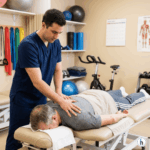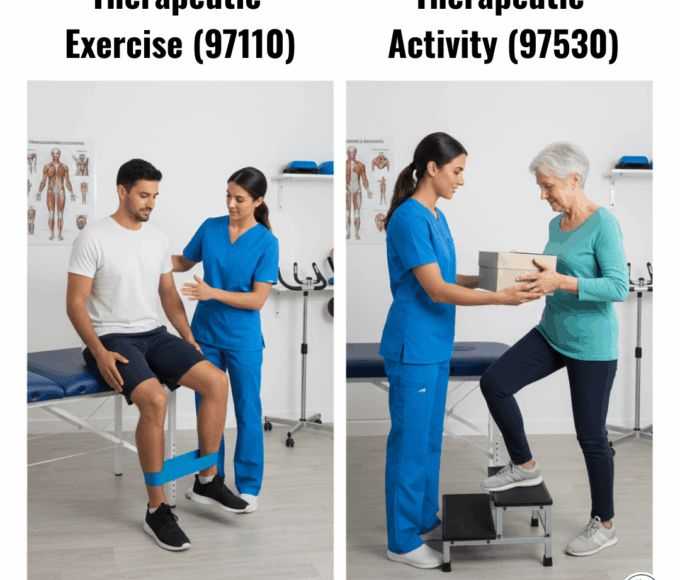Table of Contents
Learning how to become an occupational therapist is the first step toward a meaningful and inspiring career one that blends science, creativity, and human connection. Whether you’re just beginning to explore the profession or fully committed to pursuing OT school, this guide walks you through every essential step so you can confidently enter this growing and highly respected healthcare field.

Is Occupational Therapy a Good Career? A Look at Salary and Demand
Before diving into the educational steps, let’s address the most important question: is it worth it? All signs point to yes. The U.S. Bureau of Labor Statistics projects a 12% growth in OT jobs between 2022 and 2032 much faster than the average profession.
High Job Satisfaction: OTs consistently report a high level of personal fulfillment from their work.
Strong Demand: The need for OTs is growing due to an aging population and increased recognition of their role in mental health, rehabilitation, and pediatric care.
The 5 Essential Steps to Your OT Career
The journey of how to become an occupational therapist is a structured process of education, certification, and licensure. of education, certification, and licensure.
Step 1: Excel in Your Bachelor's Degree & Prerequisites
Your journey starts with a four-year bachelor’s degree. While no specific major is required, many candidates choose fields like kinesiology, psychology, biology, or health sciences. What’s most important is your performance and completing the necessary prerequisites for OT school.
Focus On: Achieving a high GPA, especially in science courses.
Must-Do: Fulfill prerequisite courses like anatomy, physiology, and statistics.
Gain Experience: Complete 40-100+ hours of observation or volunteering under a licensed OT. This is non-negotiable for a competitive application.
Step 2: Get Accepted to an Accredited MOT or OTD Program
To become an OT, you must graduate from a program accredited by the Accreditation Council for Occupational Therapy Education (ACOTE®).
You have two-degree options:
- Master of Occupational Therapy (MOT): A 2-year graduate program focused on foundational clinical skills.
- Doctor of Occupational Therapy (OTD): A 3-year clinical doctorate with extra training in research, leadership, and advocacy.
Both degrees prepare you for licensure. A key part of either program is completing Level I and II Fieldwork, where you’ll get hundreds of hours of hands-on clinical experience.
Step 3: Pass the National NBCOT® Certification Exam
After graduation, you must pass the exam from the National Board for Certification in Occupational Therapy (NBCOT®). Passing this exam earns you the “OTR” (Occupational Therapist, Registered) credential, which is required for licensing in all 50 states. The exam is a four-hour, multiple-choice test covering all aspects of clinical practice and decision-making.
Step 4: Secure Your State-Specific OT License
With your OTR credential, you can now apply for a license in the state where you wish to practice. Each state’s licensing board has its own process, but most require:
Proof of graduation from an accredited program.
Official NBCOT exam scores.
A background check.
A state jurisprudence exam (on local laws and regulations).
Step 5: Launch Your Career and Specialize
Once licensed, you’re ready to practice! OTs are needed everywhere, from hospitals and schools to home health agencies and mental health facilities. As you gain experience, you can pursue specialty certifications in areas like pediatrics, gerontology, physical rehabilitation, or hand therapy to advance your career and earning potential.
How Smart EMRs Set New OTs Up for Success
Being a great clinician is only half the battle. The other half is managing the administrative side of patient care from documenting every session to billing and compliance. A modern Electronic Medical Record (EMR) built for therapists, like HelloNote, is designed to handle this workload securely and efficiently. By automating tasks like CPT coding, goal tracking, and note-taking, it frees you up to focus on patient care, not paperwork.
Taking the Next Step
The path to becoming an occupational therapist is a commitment, but it leads to a stable, fulfilling, and impactful career. By focusing on academic excellence and gaining real-world experience, you can position yourself for success and join a profession dedicated to helping people live life to its fullest.
Frequently Asked Questions (FAQ)
It generally takes 6 to 7 years to become an occupational therapist after high school. This consists of a 4-year bachelor’s degree followed by a 2-to-3-year master’s (MOT) or doctoral (OTD) program.
To practice as an OT, you must have a graduate degree either a Master of Occupational Therapy (MOT) or a Doctor of Occupational Therapy (OTD) from an accredited institution. A bachelor’s degree in any field is required for admission to these programs.
According to the U.S. Bureau of Labor Statistics (2023 data), physical therapists (PTs) have a slightly higher median salary at $97,720 per year, while occupational therapists (OTs) have a median salary of $93,180 per year. Salaries for both can vary significantly based on location, setting, and specialty.
Getting into OT school is competitive. Acceptance rates for master’s and doctoral programs typically range from 20% to 40%. Successful applicants usually have a strong GPA (often 3.5 or higher), compelling letters of recommendation, and significant experience with patient observation or volunteer hours.
An MOT is a master’s degree focused on clinical practice preparation. An OTD is a clinical doctorate that includes advanced training in research, leadership, and advocacy. Both degrees qualify you for the NBCOT exam and state licensure.
Yes, for those passionate about helping others, occupational therapy is widely considered a worthwhile career. It has high job satisfaction, strong projected job growth (12% from 2022-2032), and a median salary of over $93,000, offering both personal fulfillment and financial stability.




















